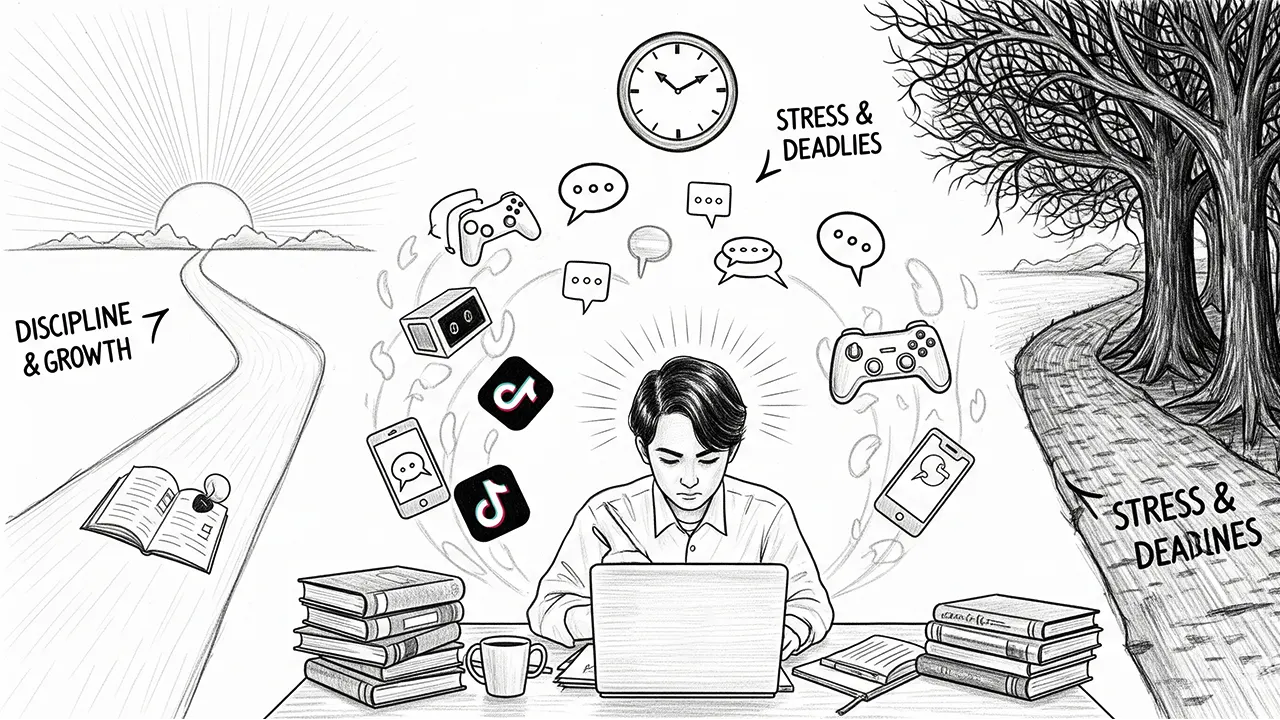Why Do Students Commonly Struggle with Procrastination?
Many students frequently face anxiety and fear when assignments that were given well in advance suddenly approach their deadlines. Among Indonesian students, one of the most common academic challenges is procrastination—specifically academic procrastination.
According to a study by the American Psychological Association (APA), procrastination is not simply a matter of laziness, but also deeply connected to emotional regulation. Students often postpone tasks to avoid negative feelings such as stress, uncertainty, or anxiety related to potential failure.
When assignments that were given weeks or even months ago draw near, many students feel overwhelmed. This essay explores the root causes of academic procrastination, its impact on student performance and grades, and evidence-based strategies—supported by research and updated initiatives for 2024–2025—that can help students overcome this habit.
Causes of Academic Procrastination Among Students
Procrastination is a common response when students face assignments they find too difficult, boring, or time-consuming. Often, students become too comfortable in their routine, easily distracted by more enjoyable activities, under the belief that they still have plenty of time to finish their work.
A 2024 study published in the Tarumanagara Medical Journal revealed that 15.1% of students display high levels of procrastination, while 55.1% report experiencing academic stress. Poor time management skills and low motivation further exacerbate this issue.
In today’s tech-driven era, digital distractions have become one of the biggest hurdles for students. Platforms like YouTube, Instagram, and TikTok, along with online games and constant notifications, often pull students away from their academic responsibilities.
Additionally, the pressure of juggling numerous assignments, extracurricular activities, and part-time jobs can lead students to seek temporary “escapes” through digital entertainment. Unfortunately, this only increases their workload and stress levels in the long run.
A 2024 study from the University of Padang identified three primary factors contributing to student procrastination: low self-efficacy (13.7%), poor time management (33.2%), and lack of learning motivation (19.1%).
Practical Strategies to Overcome Procrastination
In college life, it’s common for students to delay academic tasks. Often, they justify it with reasons like, “The material is too hard—I’ll do it later when I’m in the mood,” or “The deadline is still far away—I’ll relax first.” Sometimes, even a friend’s invitation to hang out can become an excuse.
To become more productive, students must recognize and confront these patterns. One effective method is to shift their mindset: if a task feels overwhelming, start with the simplest part. Seek out extra information through books or online sources. Try to recall how stressful last-minute cramming felt the last time—use that as motivation.
Once a student decides to start, the following steps can help manage and complete assignments more efficiently:
Begin with Research
Use the university’s digital library or tools like Google Scholar before writing. For instance, if writing about “character education in the digital age,” searching for related articles will give clearer ideas and direction.
Select the Right Study Time
Match study time to your energy levels. Don’t force yourself to study when you’re mentally or physically drained. Studying during your most alert hours boosts focus and productivity.
Minimize Distractions
Limit the use of devices and apps that break concentration. Place your phone out of reach or activate focus mode. Some students even lock their phones away to stay committed to their tasks.
Reward Yourself
Give yourself small rewards after completing parts of an assignment—such as your favorite snack, a short break, or a quick episode of a show. Recognizing progress helps maintain motivation and lowers stress.
Study with Friends
Collaborating with classmates can make learning more enjoyable and productive. Discussions with peers often enhance understanding, offer support, and make tasks feel less burdensome.
What Students Must Remember
Procrastination often arises when students feel overwhelmed, tired, or uninterested. However, when this habit becomes constant, it leads to more stress, unmanageable workloads, and poor academic outcomes.
To break the cycle, students must identify the root causes—be it low motivation, weak time management, or digital distractions. From there, they can take proactive steps like conducting early research, planning effective study sessions, and removing distractions.
Motivation can be sustained by acknowledging one’s own progress and, when needed, asking for support from peers. Ultimately, academic success is not only about intelligence, but also about self-discipline, responsibility, and consistent effort.
Supervisor : Dr. Muhammad Iman Sastra Mihajat








